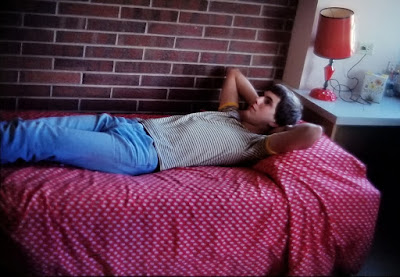At eighteen years of age, a fledgling with fresh feathers, I left the nest and ventured into the hard, teeth-snapping world of semi-adulthood. College.
One late summer day in 1981, my father drove me to the University of Wyoming in Laramie. As the car pulled away from my home at the start of that six-hour drive, I watched my mother diminish in the rear view mirror. Her tiny waving hand―no bigger than a Barbie doll’s―grew smaller and smaller. And then, no bigger than an ant, she turned back into the house and closed the door.
This was the moment separating my Before and my After.
What must my mother have been thinking? How hard did she struggle not to cry? Or did she give herself over to damp cheeks? And my father, blithely and stoically chatting about the weather and the grazing antelope and my class schedule, what did he think? What did he feel? What did he not say during the silences of those six hours in the car?
He helped me carry the boxes and luggage up to my dorm room in White Hall. I unfurled my bedspread―the one that had covered me every night since junior high―across the bed. I plugged in my lamp, I hung up my shirts, I looked out my twelfth-floor window at the campus. The full weight of responsibility settled on my shoulders: I was on my own.
My father cleared his throat. It was time for him to start back on the drive home―my old home now. He snapped a few photos of me lying on my rumpled bed, looking at my wall locker, trying out my new life. And then he was gone.
While my two years of undergraduate study as a theater major at the University of Wyoming were not exactly, as Anthony Trollope would say, “full of dissipation,” I will say some of my oats, both wild and domestic, were sown during those semesters in the high plains of Laramie. These were the two years when I began exploring, hesitantly and shyly, my new After.
Speaking of Trollope (for we should always be speaking of Trollope), I recently regaled myself once again with the glories of his writing. Which is to say, I read The Small House at Allington. In its pages, Trollope introduces us to a young man of earnest business, Johnny Eames. He, too, was auditioning for adulthood.
I won’t go into all the details of Mr. Eames’ story of love hoped for and love rejected and love almost regained which Trollope unfolds in these pages (you should all read The Small House at Allington for yourselves because it is delicious), but I want to point you mothers and fathers of fledglings flying off to college (or to a new job or perhaps off on a gap year) to this passage in which young Eames, who was older than me by only two or three years at the time of our oat-sowing, becomes aware of his pending responsibilities as an adult:
Much of the feeling and something of the knowledge of manhood was coming on him, and he was beginning to recognize to himself that the future manner of his life must be to him a matter of very serious concern. No such thought had come near him when he first established himself in London. It seems to me that in this respect the fathers and mothers of the present generation understand but little of the inward nature of the young men for whom they are so anxious. They give them credit for so much that it is impossible they should have, and then deny them credit for so much that they possess! They expect from them when boys the discretion of men,—that discretion which comes from thinking; but will not give them credit for any of that power of thought which alone can ultimately produce good conduct. Young men are generally thoughtful,—more thoughtful than their seniors; but the fruit of their thought is not as yet there. And then so little is done for the amusement of lads who are turned loose into London at nineteen or twenty. Can it be that any mother really expects her son to sit alone evening after evening in a dingy room drinking bad tea, and reading good books? And yet it seems that mothers do so expect,—the very mothers who talk about the thoughtlessness of youth! O ye mothers who from year to year see your sons launched forth upon the perils of the world, and who are so careful with your good advice, with under flannel shirting, with books of devotion and tooth-powder, does it never occur to you that provision should be made for amusement, for dancing, for parties, for the excitement and comfort of women's society? That excitement your sons will have, and if it be not provided by you of one kind, will certainly be provided by themselves of another kind. If I were a mother sending lads out into the world, the matter most in my mind would be this,—to what houses full of nicest girls could I get them admission, so that they might do their flirting in good company.
Postscript: Personally-speaking, I did find a nice girl and I did my flirting in good company. We’re still flirting after thirty-five years.

















David, you are such a wonderful writer. Your beginning passage was delightful, and it paired so nicely with Trollope's. Thank you for sharing this snippet.
ReplyDelete